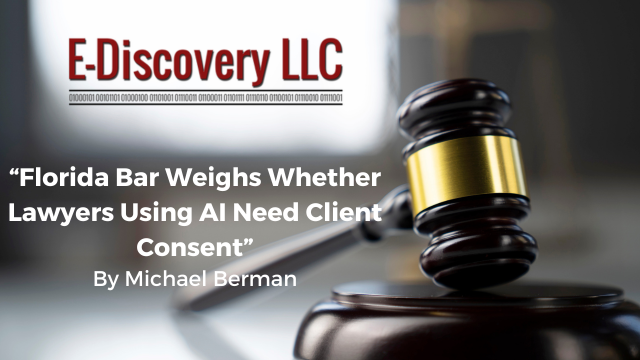
[EDRM Editor’s Note: The opinions and positions are those of Michael Berman.]
“Florida lawyers might soon be required to get their client’s consent before using artificial intelligence on their legal matters.” Karen Sloan, “Florida bar weighs whether lawyers using AI need client consent | Reuters (Oct. 16, 2023). Ms. Sloan’s article reports that “Florida looks to be the first jurisdiction considering a consent rule for lawyers using AI.”
The Florida Bar has asked Florida attorneys to comment on a proposal. Id. The proposal is posted at Proposed advisory opinion on Lawyers’ and Law Firms’ Use of Generative Artificial Intelligence – The Florida Bar. The Florida Bar’s website states:
There are no drafts for the committee’s consideration at this time. The proposed advisory opinion will address:
1) Whether a lawyer is required to obtain a client’s informed consent to use generative AI in the client’s representation;
2) Whether a lawyer is required to supervise generative AI and other similar large language model-based technology pursuant to the standard applicable to non-lawyer assistants;
3) The ethical limitations and conditions that apply to a lawyer’s fees and costs when a lawyer uses generative AI or other similar large language model-based technology in providing legal services, including whether a lawyer must revise their fees to reflect an increase in efficiency due to the use of AI technology and whether a lawyer may charge clients for the time spent learning to use AI technology more effectively;
4) May a law firm advertise that its private and/or inhouse generative AI technology is objectively superior or unique when compared to those used by other lawyers or providers; and
5) May a lawyer instruct or encourage clients to create and rely upon due diligence reports generated solely by AI technology?
Proposed advisory opinion on Lawyers’ and Law Firms’ Use of Generative Artificial Intelligence – The Florida Bar.
The ABA Model Rule and Maryland Attorneys’ Rules of Professional Conduct 1.1 have long included a requirement of competent representation. Some states have adopted rules requiring technological competence. 40th State Adopts a Duty of Technological Competence – Is It a Good Idea? It will be interesting to see what direction this proposal follows.


